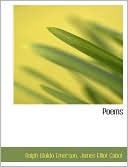

 |

|

The average rating for Poems based on 2 reviews is 5 stars.
Review # 1 was written on 2015-11-12 00:00:00 Mike Nowotny Mike NowotnyEmily Dickinson is one of my favourite poets; she is the gothic queen of poetry. At times she strongly reminds me of Edgar Allan Poe. Her poems are less macabre than Poe's and certainly less fantastical, focusing more on human perception of the darkness and the realities of life, but her work is undoubtedly on par with his in the vein of dark romanticism. There's just something exceedingly morose about the way in which she writes. She was terribly depressed for much of her life, and such a pessimistic attitude to life can be seen within her writing. These are the words of a woman completely disillusion with the human experience; there is little light in these poems. Humans are portrayed as weak and self-destructive; they are at times evil and even hellish in nature. All depictions are typically one sided with the darkness conquering any sense of hope. If anything hope is dead within her words. There is only one thing we are striving for in life, and that's the end according to such thinking. Death Read enough of Dickinson's poetry and you will see how obsessed with death she is; it a recurring theme across her work, one she brings up time and time again. She spent most of her life in solitude so it's no surprise that she came up with poetry so dark in content; she had a miserable life, and it reflects in the nature of her writing: "Because I could not stop for Death - He kindly stopped for me - The Carriage held but just Ourselves - And Immortality." The words feel calm and almost serene, as the speaker is accepting of her mortality. She establishes the idea that death is not a choice; it just happens like life just happens. So we should just sit back and enjoy the ride, as she does in Death's carriage. It passes through the surrounding scenery at a slow pace and observes children playing near wide open fields. This is indicative of the fact that death will come for everyone: there's no escaping it. The speaker is only half dressed, which suggest that nobody is truly ever ready for death; it comes when it will come never mind how unprepared you are. Death waits for no man. Death is personified as a gentleman here, one who will escort her to the afterlife. Death, to Dickinson, is not the end; it is the road to immortality: the beginning. Indeed, at the end of the poem she reveals she has actually been dead for centuries (shock-horror!) We're left with the lingering image of dead horses perpetually pushing her forward into eternity. It's a wonderful poem, dark and gripping, ethereal and enchanting. Of all of Dickinson's poetry, this is the one that sticks with me. Years after I first read it, I still hear the opening lines. She also characterises God as a reckless and almost careless deity. He is not the ideal that many perceive him to be. At the moment of death he fumbles at your soul; you are not elevated or taken to heaven, but "stunned" and "scalped" in the process, then struck like a "thunderbolt." God has paws which make him sound animalistic and beastlike; he is not kind and forgiving. Death is not the end, but it doesn't have to be a glamourous experience. Indeed, in another poem the speaker is transfixed by the buzzing of a fly as she lies on her death bed. It's the last thing she hears; it's her last experience on earth. In this, it abandons all glorified religious imagery, and almost portrays an ironically realistic moment. She further hints that faith only works for those that are truly devout. If you don't really believe in it, then calling upon God's name is pointless. She suggests that those people should look to science for the answers rather than a false bastion they don't really believe in. Dickinson is my idea of the perfect poet. She is a religious sceptic, but she is not dismissive of a possible truth in religion. Her poetry dances between opposing ideas and it doesn't suggest truth in either of them; thus, it is open to interpretation and debate. It can be read in different ways and through this it is profound, powerful and utterly beautiful. I love her unique style, though she's not one that's going to leave you feeling uplifted after reading her work that's for sure. |
Review # 2 was written on 2012-10-28 00:00:00 Leroy Tate Leroy Tate1 Because I could not stop for Cops They kindly Stopped for Me The Roadblocks covered all three lanes Perfect Symmetry 2 A narrow Fellow - in the grass With one eyed - snake - and smile You may have met him - did you not The local - paedo - phile 3 I heard a Boy-Band - when I died The Radio - was on And rushing so - to switch it Off And catching - my left Thumb And dancing round in - Painful Jig And - tripping on a clod Such - Banal invitation - to The Vestibule of God 4 Hope is a thing with feathers That perches in my Bowl And pecks up all my Cereal Until it's drowned in milk 5 When the Landlord turned - the drunken Bee Out of - the Foxglove's door, They arrested him - for being "twee" And broke his - fingers four |
CAN'T FIND WHAT YOU'RE LOOKING FOR? CLICK HERE!!!